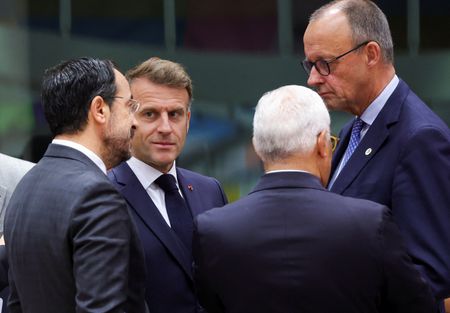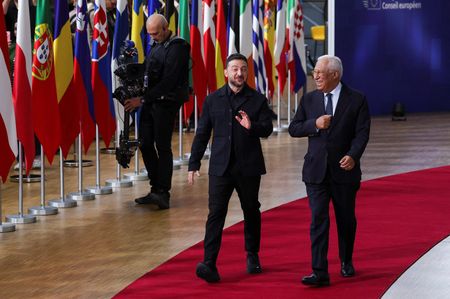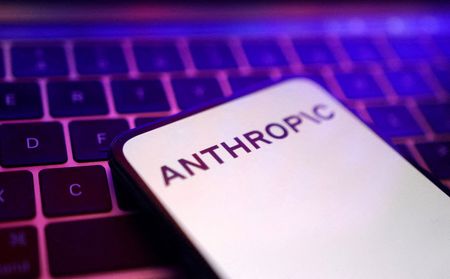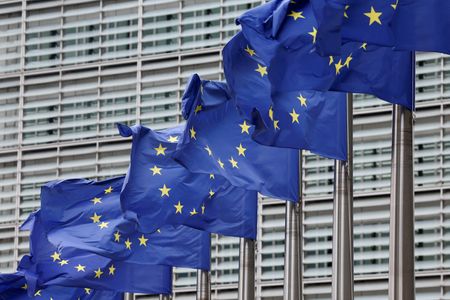By Kate Abnett, Bart H. Meijer and Miranda Murray
BRUSSELS (Reuters) -European Union leaders agreed on Thursday for the bloc to move ahead with setting a 2040 emissions target, which it is racing to do ahead of next month’s global U.N. climate talks, despite growing pushback on green measures from some member states.
The EU is trying to pass a new target to cut net greenhouse gas emissions 90% by 2040 to put the bloc on track for net-zero emissions by 2050 – seen by scientists as an essential step to avert the worst impacts of global warming.
The 2040 target aims to keep the EU on track between its existing legally binding commitment to cut emissions 55% by 2030, and the 2050 target.
EU governments’ leaders agreed on Thursday to proceed with the 2040 target, but leave details for ministers to approve at a November 4 meeting. That is a challenging task, since leaders did not resolve key sticking points, including what share of the 90% emissions-cutting goal countries can meet by buying foreign carbon credits.
“None of us are questioning the goal of climate protection. All of us are of the opinion that we must combine this with the competitiveness of European industry,” German Chancellor Friedrich Merz said.
The leaders did agree to impose some conditions on the target, reflecting some capitals’ concerns over how to finance the low-carbon transition alongside priorities like defence against Russian aggression and revitalising businesses.
In their joint summit statement, EU leaders said the 2040 target should include a “revision clause” to potentially weaken it in future.
Countries including Poland have argued this is needed in case green technologies do not develop as planned, or economic conditions hamper the investments needed to achieve the climate target.
Wealthier western and northern countries – whose uptake of electric vehicles and renewable energy has surpassed that of poorer EU states – are more confident. But they, too, want more flexible targets, reflecting concerns including that their forests are struggling to absorb CO2 emissions because of problems including wildfires.
Leaders also demanded that if forests underperform on absorbing CO2 emissions, other industries will not be forced to cut emissions faster to deliver the 2040 goal.
TALKS TO FOCUS ON FINANCING AND FLEXIBILITY
Last month, the EU missed a U.N. deadline to pass its climate target, and it is racing to approve the goal before world leaders gather at the COP30 climate summit on November 6-7.
Despite worsening extreme weather worldwide, ambitious efforts to fight climate change are flagging. In the U.S., President Donald Trump has dismantled emissions-cutting measures.
EU government heads focussed their talks on the so-called “enabling conditions” – financing and supportive policies – needed to reduce greenhouse gas emissions, while avoiding higher energy bills for citizens and supporting businesses grappling with cheap Chinese imports and U.S. tariffs.
Dutch Prime Minister Dick Schoof said he expected the EU to stick to its climate goals – which, for 2030 at least, official data suggest the bloc is largely on track to meet. “But we will have to take a good look at how we keep them feasible for citizens and corporations,” he added.
EU TO AMEND MORE CLIMATE LAWS
Brussels has already scaled back numerous sustainability policies this year, in an attempt to contain political pushback, both from EU governments and trade partners including the U.S. and Qatar.
Seeking to shore up support for the 2040 climate goal, European Commission President Ursula von der Leyen told leaders ahead of their summit that the shift to a clean economy was Europe’s chance to revitalise industries and cut reliance on imports from China, which dominates manufacturing of technologies such as batteries and solar panels.
“This is a major business opportunity for Europe. Seizing it requires steadfastness and an unrelenting drive to face off our competitors, starting with China,” von der Leyen said in a letter seen by Reuters and dated October 20.
She also promised to amend some climate measures – including controlling prices in an upcoming carbon market for transport fuels, and strengthening the EU’s carbon border levy – a key demand of France. Brussels is also considering weakening its 2035 combustion engine ban after pressure from Germany and Italy.
(Reporting by Kate Abnett, Philip Blenkinsop, Andrew Gray, Julia Payne, Charlotte Van Campenhout, Alessandro Parodi, Bart Meijer, Miranda Murray; Editing by Nia Williams, Philippa Fletcher and David Gregorio)










